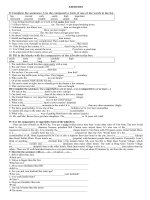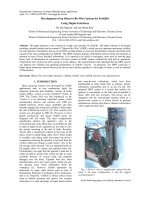Tài liệu Development of national target program on climate change adaption docx
Bạn đang xem bản rút gọn của tài liệu. Xem và tải ngay bản đầy đủ của tài liệu tại đây (594.27 KB, 34 trang )
DEVELOPMENT OF
DEVELOPMENT OF
NATIONAL TARGET PROGRAM
NATIONAL TARGET PROGRAM
ON CLIMATE CHANGE
ON CLIMATE CHANGE
ADAPTATION
ADAPTATION
LEGAL DOCUMENT
• Government Decision No 60/2007/NQ-CP Dated 03
Dec. 2007: “Assign Ministry of Natural Resources and
Environment to be in charge, in collaboration with
other Ministries and Sectors, to develope National
Target Program on Climate Change Adaptation, search
for international assistance for the Program, and
submit to the Prime Mnister in the Second Quarter of
2008”.
INTRODUCTION
INTRODUCTION
1) The National Target Program (NTP) will communicate priority
activities addressing the urgent and immediate needs and concerns
of the country, relating to adaptation to the impacts of CC.
2) Activities proposed through NTP would be those whose further
delay could increase vulnerability, or lead to increased costs at a
later stage.
3) The NTP will be presented in the form of a document specifying a
list of priority activities, with a concise justification based on a
tight set of criteria.
4) The NTP document will not be an end in itself, but rather a means
for the dissemination, of its proposed program of action to address
its urgent needs for adaptation. The priority activities identified
through the NTP process will be made available for funding,.
I. OBJECTIVES AND SCOPE
I. OBJECTIVES AND SCOPE
Objectives of the Activity is to develop the national target
program for coping with climate change, focusing on
awareness raising on climate change, and policy
development for the country about climate change
mitigation and adaptation, integrating climate change
information into the social-economic development
strategy, provincial, sector development strategy and
international commitment.
Scope of Work
1) Identify CC features of Vietnam due to global CC;
2) Assess CC impacts on national, provincial, sectoral
development plans and programs;
3) Identify the needs adaptation to potential impacts of CC;
4) Develop effective adaptation measures to be integrated
into national, sectoral and provincial social-economic
development plans and strategy;
5) Identify a portfolio of priority activities/projects to be
implemented for the most sensitive and vulnerable sectors
and provinces;
6) Identify a policy of Vietnam on international and regional
cooperation and negotiation on CC mitigation and
adaptation.
Integrated
• Bottom-up approach ,
involves broad range of
stakeholder groups,
focusing on local
communities, consider
current vulnerability and
urgent adaptation needs.
• Participatory process,
involves multistakeholder
consultation, two-way
discussions and
feedback..
Multidiscipline
Stakeholder
Consultation
• Multidisciplinary,
through the
involvement of a
multidisciplinary
group of experts.
• Comprehensive/
integrated assessment
type of approach,
• Looking across
different ecological
regions and sectors as
well as interactions/
linkages between
them.
•Synergy with activities
implemented under other
Agreements,
•Poverty reduction
•Sustainable development
•Country-driven, result in
country, region or sector-
specific projects
•Sound envi. management
•Cost effectiveness.
•Simple, reflects urgent
and highly ranked
adaptation measures.
National
Target
Program
APPROACH
APPROACH
APPROACH
Study Area
•For the whole country;
•Focusing on the most sensitive and vulnerable sectors,
regions and provinces.
Program Schedule
•Program development: 6 months (1/2008 - 6/2008)
•Program implementation: will be identified based on
urgent immediate activities and long term strategy for CC
adaptation.
Funding
•Funding for Program development and implementation:
National budget and international assistance.
ACTIVITIES
ACTIVITIES
ACTIVITIES
ACTIVITIES
Identify
Priority
Activities
Assessment
of CC
Impacts
Identify
Adaptation
Measured
Identify
National
Targets
National
Target
Program
Capacity,
Awareness
Climate Variability,
and CC
Impacts of CC
Policy
Reform
Portfolio
of Priority
Activities
Science &
Technology
Mobilize
Financial
Sources
Cooperation
Negotiation
Science
&
Technology
Financing
Cooperation
Negotiation
Judgment
of Investment
Mechanisms
Cost/
Benefit
Analysis
2.1.1 Establishment of a Steering Committee
2.1.2 Establishment of an Executive Committee for
Action Implementation
2.1.3 Establishment of Task Force Groups
1) Sectoral Task Force Groups:
Energy; Construction;
Transportation; Healthcare; Agriculture, Forestry and
Aquaculture; Foreign affairs; Natural resources and
environment; Tourism; Labor, invalids and social affairs…
2) Regional Task Force Groups:
Northern mountainous (14
provinces/cities); Red River Delta (10); North Central region
(6); South Central costal (8); Central Highlands (5); South
Eastern (6); Mekong River Delta (13).
2.1Establishment of Management and
Implementation Organization for the Activity
Preparation Process
of the
National Target Program
National Executive
Committee
(Director,
Coordinators,
Members)
Sectoral Expert
Groups & Task Force
groups
- Adaptation policy
framework;
- Methodologies used in
previous studies.
National experts
International experts
National Steering
Committee
-Chair: MONRE;
-Members: MARD,
MOI&T, MOT, MOET,
MOH, MOLISA,
MOST, MPI, MOFA…
Inception Workshop
Discussion on Vulnerability &Adaptation
Assessment Methodology for Sectoral Assessment
Synthesize
Impacts, Coping Strategies, Vulnerabilities, Dev.
Challenges & Trends, Dev. Framework etc.
Regional Stakeholder Consultations
Identification of Climate Related Problems,
Coping Strategies, & Future Adaptation Measures
Sectoral Assessment Report
Impacts, Vulnerability and Adaptation Measures
Identification of Priority Activities
Based on results from Consultations and Sectoral
Assessment Report
Criteria Development
for Prioritization of Adaptation Measures
National Stakeholders Consultation
Prioritization and Rank AdaptationMeasures
Final Target Program Document
Profile of Potential Projects Demonstrating
Integration into National Target Program
Endorsed by the Government
- Previous studies;
- National development
plans;
- National strategy for
sustainable
development;
- National strategy for
natural disaster
prevention;
- National strategy for
water management and
conservation;
- National strategy for
envi. protection;
- Sectoral development
plans.
Policy Guidance
& Management
Tasks and Outcome
Key Secondary
Documents
2.2.1 Assessment of CC Features and Climate
Variability in Vietnam
1) Development of Methodology for CC/Variability Assessment
2) Assessment of Magnitude, Characteristics and Trend of
Change: Temperature; Rainfall; Typhoon and Tropical
depression; Monsoon; Water Resources; Floods and Drought;
ENSO; SLR.
3) Analysis of CC Scenarios for Vietnam for the Period 2010-
2100
• CC scenarios need to be agreed on and accepted before being used in
the evaluation of the effects of climate change.
• The recognition of CC scenarios is also necessary in determining
response measures to set forth instructions and criteria for sectoral and
local planning, to inspect existing infrastructure and planning
strategies for the future.
2.2 Evaluation of CC Impacts
2.2.2 Preliminary Evaluation of CC Impacts
Evaluate the impacts of CC on different socio-economic sectors,
industries and localities, especially those are sensitive and
vulnerable to effects of CC.
1)Impacts of CC on Natural Resources: Water sources; Effects of
SLR; Land use; Environment; Ecosystems.
2)Impacts of CC on Sectors: Energy; Construction; Transportation;
Healthcare; Agriculture, forestry and aquaculture; Natural resources
and environment; Tourism; Labor, invalids and social affairs.
3)Impacts of CC on Regions: Northern mountainous region; Red river
delta region; North central; South central coastal; Central highlands;
South eastern; Mekong River delta.
4)Evaluate Vietnam’s Opportunities to Mitigate and Adapt to CC.
2.2 Evaluation of CC Impacts









